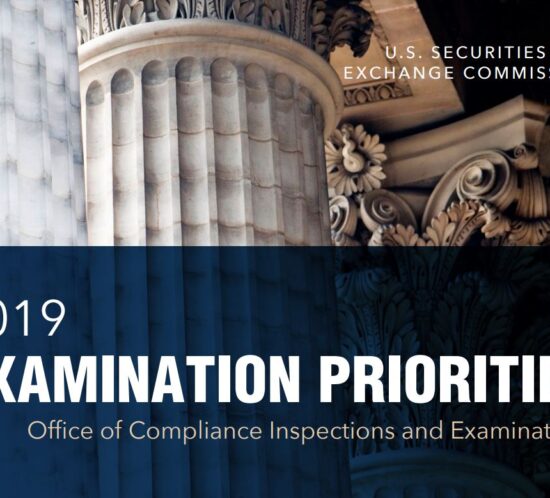SEC OCIE Issues 2019 Examination Priorities
Well ahead of the New Year, the SEC Office of Compliance Inspections and Examinations (OCIE) announced its 2019 examination priorities. In keeping with OCIE’s four “pillars” of promoting compliance, preventing fraud, identifying and monitoring risk, and informing policy, the Dec. 20 release provides a preview of key areas where OCIE intends to focus its limited resources.
Here is a brief overview of the six themes for OCIE’s 2019 Examination Priorities. We encourage you to read the entire report.
Matters of importance to retail investors, including seniors and those saving for retirement
Fees and Expenses
Disclosure of the costs of investing – OCIE will continue to review fees charged to advisory accounts, ensuring that the fees are assessed in accordance with the client agreements and firm disclosures. With respect to mutual fund share classes, OCIE will continue to evaluate financial incentives for financial professionals that may influence their selection of particular share classes. OCIE remains focused on investment advisers participating in wrap fee programs, which charge investors a single bundled fee for both advisory and brokerage services.
Conflicts of Interest
Examinations will review policies and procedures addressing the following:
a. Use of Affiliated Service Providers and Products
b. Securities-Backed Non-Purpose Loans and Lines of Credit
c. Borrowing Funds from Clients
Senior Investors and Retirement Accounts and Products
OCIE will continue to review the services and products offered to seniors and those saving for retirement. These examinations will focus on, among other things, compliance programs of investment advisers, the appropriateness of certain investment recommendations to seniors, and the supervision by firms of their employees and independent representatives.
Portfolio management and Trading
OCIE will review firms’ practices for executing investment transactions on behalf of clients, fairly allocating investment opportunities among clients, ensuring consistency of investments with the objectives obtained from clients, disclosing critical information to clients, and complying with other legal restrictions.
OCIE will also examine investment adviser portfolio recommendations to assess, among other things, whether investment or trading strategies of advisers are: (1) suitable for and in the best interests of investors based on their investment objectives and risk tolerance; (2) contrary to, or have drifted from, disclosures to investors; (3) venturing into new, risky investments or products without adequate risk disclosure; and (4) appropriately monitored for attendant risks.
Never-Before or Not Recently-Examined Investment Advisers
OCIE will continue to conduct risk-based exams of adviser that have never been examined, newly registered advisers, advisers that have not been examined for a number of years and may have substantially grown assets or changed business models.
Mutual Funds and Exchange Traded Funds
OCIE will focus on risks associated with the following: (1) index funds that track custom-built or bespoke indexes; (2) ETFs with little secondary market trading volume and smaller assets under management; (3) funds with higher allocations to certain securitized assets; (4) funds with aberrational underperformance relative to their peer groups; (5) funds managed by advisers that are relatively new to managing Registered Investment Companies (RICs); and (6) advisers that provide advice to both RICs and private funds with similar investment strategies.
Municipal Advisors
Broker-Dealers Entrusted with Customer Assets
With a focus on compliance with Exchange Act Rule 15c3-3 as well as procedures and controls.
Microcap Securities
A continuation of exams of broker-dealers involved in selling stocks of companies with market caps under $250 million.
Compliance and risk in registrants responsible for critical market infrastructure:
a. Clearing Agencies
b. Entities subject to Regulation Systems Compliance and Integrity (Regulation SCI)
c. Transfer Agents
d. National Securities Exchanges
Select areas and programs of FINRA and MSRB
Examinations of FINRA will continue to focus on FINRA’s operations and regulatory programs and the quality of FINRA’s examinations of broker-dealers and municipal advisors that are also registered as broker-dealers. OCIE will continue to conduct inspections of MSRB to evaluate the effectiveness of MSRB’s policies, procedures, and controls.
Digital Assets
OCIE will continue to monitor the offer and sale, trading, and management of digital assets, and where the products are securities, examine for regulatory compliance.
La cyber-sécurité
OCIE will continue to prioritize cybersecurity in each of its five examination programs. Exams will focus on, among other things, proper configuration of network storage devices, information security governance generally, and policies and procedures related to retail trading information security. Specific to investment advisers, OCIE will emphasize cybersecurity practices at advisers with multiple branch offices, including those that have recently merged with other investment advisers, and continue to focus on, among other areas, governance and risk assessment, access rights and controls, data loss prevention, vendor management, training, and incident response.
Anti-Money Laundering
OCIE will continue to prioritize examining broker-dealers for compliance with their AML obligations, including whether they are meeting their SAR filing obligations, implementing all elements of their AML program, and robustly and timely conducting independent tests of their AML program.
CSS Shortlisted for Two HFM US Hedge Fund Technology Awards
We are proud to announce that Compliance Solutions Strategies has been shortlisted in two categories for the HFM US Hedge Fund Technology Awards 2019.
We are one of nine finalists for the Best RegTech solution award for our best-in-class solutions, which cover regulatory reporting, regulatory data management, compliance services, and trade monitoring & analysis. We are also one of eight nominated for best cybersecurity solution for Shield.
The Awards recognize and reward IT and software providers serving the hedge fund sector that have demonstrated exceptional customer service and innovative product development over the past 12 months. The winners will be announced in February 2019 in New York.
European Commission Approves Draft Technical Standard for SFTR
After several delays earlier this year, the European Commission has finally approved the draft technical standard (RTS) for SFTR. The European Parliament now have up to six months to scrutinize the legislation, which has been changed from the previous three-month suggestion. That means that the regulation will be published in the official journal by July 1, 2019 at the latest. First in line to start reporting are Credit institutions and Investment firms, which will be one year after the publication, followed by a phased-in approach for other market participants in scope.
The uncertainty around the RTS approval have led many firms to put their SFTR projects on hold and firms may now feel a greater sense of urgency to implement SFTR. If not already begun, firms should immediately start reviewing readiness for SFTR implementation and allocate budget for next year.
To successfully meet the SFTR obligation, it will be particularly important to resolve the data sourcing and reconciliation challenges. As transaction reporting obligations continue to increase with the rollout of SFTR, it is becoming more imperative than ever for firms to take a strategic approach and adopt automated solutions that extend across multiple regulations.
Did you know that there is a 30% overlap between EMIR and SFTR?
Read our white paper on SFTR to learn more about the challenges SFTR bring.
For questions on how we can help, contact Andreas Bergh at +46(0)8 1213 9519 or andreas.bergh@tradechannel.se
A New View of How Technology Will Change the Emerging Crytpo-Economy
From the top of the world, it’s amazing what you can see. I recently had the opportunity to travel to the United Arab Emirates to speak in Dubai at the 7th Edition of the Alternative Investment Management Summit. While I was there, I took a few moments to ride to the top of the Burj Khalifa, currently the tallest building in the world, and the view was incredible. Other skyscrapers, once relatively tall in their own right, seemed like little matchboxes down below.
And it occurred to me at that moment that the awe-inspiring view from the top of the Burj Khalifa is the perfect metaphor for the incredible pace of technological change that we are witnessing in the financial industry. What is cutting edge one moment can be challenged in an instant by other players looking to go even further, taller, faster.
Nowhere was this rapid change more evident than at the AIM Summit, where I had the pleasure to speak on “The Emerging Crypto-Economy” and “AML and KYC on Blockchain.” In the U.S., we take for granted that our banks generally tend to be trusted institutions – you put money in, and you expect it will be there when you need to withdraw it. In other parts of the world, banks do not have the same level of trust. The distrust for traditional financial institutions, when combined with a millennial generation that came of age with technology, is causing a paradigm shift; and entirely new financial instruments (i.e. cryptoassets) and financial infrastructure (i.e. blockchain) are causing established industry participants to take notice. In fact, even the question of whether cryptocurrency should be deemed its own asset class is the subject of debate.
The emerging crypto-economy reminds me of the way in which Amazon changed retail. Online shopping changed our economy from one in which consumers felt the need to physically touch goods and products before buying them, to one in which consumers were comfortable purchasing online, sight unseen. Similarly, the new crypto-economy is one in which we can digitize almost anything. But just because we can, should we?
This new crypto-economy includes three components:
- Digitization of information
- The secure storage, transmission, and sharing of that information, and
- A value proposition, such as efficiency or cost. In other words, it has to make something better for it to be a worthwhile effort.
Unfortunately, with certain cryptocurrency exchanges reporting the theft of hot wallets, and one study reporting that hackers have caused $882 million in damages to cryptocurrency exchanges, it is clear that the public at large needs to get comfortable with the underlying technology and security before we see a large industry shift.
That shift is already under way though. With Fidelity and Northern Trust moving into the crypto space, institutional money is poised for deployment into what has traditionally been a playground for retail investors. The expansion towards institutional players may shift focus towards stronger anti-money laundering (AML) processes. Some cryptocurrency exchanges only require as little as a mobile phone number and an email address to start trading, while other exchanges require a government identification and additional verification steps.
The Wall Street Journal earlier this year estimated that $88.6 million was laundered on 45 cryptocurrency exchanges, and highlighted exchanges such as ShapeShift that provide users with the ability to convert Bitcoin to Monero, a currency that is relatively anonymous and untraceable.
Technologies such as blockchain appear ready to provide new solutions to address these emerging issues, and may be able to provide for more efficiency in the process. Think for a moment about the investor who must provide identification paperwork to numerous funds and investment advisers as part of the current AML process. If that information can be digitized once, placed on a blockchain, and securely shared with trusted third parties, the AML verification process can be made more efficient. Capital calls, settlement, and other processes appear to be ripe for blockchain applications as well.
Only time will tell what technological changes today will radically shape the financial industry. But from where I’m standing, the view looks great out there.
CSS Integration Hub: Integrating Investment Data Systems – Internal build or a vendor solution?
Identifying the strategic need for the implementation of an integration hub for financial transactions, positions and securities.
When consolidating data from front- and back-office applications, an increased need arises for systems integration and a certainty that securities and reference data are in sync.
Regulations such as MiFID II, EMIR, SFTR and EU Short Selling rules increase the need for efficient data deliverables. New requirements around transparency also increase the need for security and holdings data. The data landscape as we know it is changing, posing constant challenges for infrastructure to support efficient processes.
Successfully integrating applications and external parties requires standards, monitoring, scalability and, in most cases, encrypted communication.
Manual processes are not cost-efficient in an ever-changing data landscape. Market participants ought to look at integration from a strategic perspective, rather than a tactical one.
CSS Integration Hub is a highly flexible integration platform that interconnects an investment firm’s core systems internally, as well as with external partners, platforms and utilities.
SFTR: An Operational Game Changer for the Market
Introduction: SFTR Update
Securities Financing Transactions Regulation (SFTR) requirements are expected to be adopted by the European Commission (EC) by Q1 2019. Prior to finalisation, the EC and the European Securities and Markets Authority (ESMA) must resolve some differences over the SFTR level 2 Regulatory Technical Standards (RTS), but no further material changes are expected. Reporting of securities financing transactions (SFTs) to authorised trade repositories (TRs) would then commence in Q1 2020, requiring investment firms to report all new SFT trades; amendments; corrections; life cycle events; and collateral valuations and re-use on a daily
basis.
While firms may be tempted to put SFTR implementation projects on hold pending the EC’s final endorsement of the RTS, the reporting obligations are well known at this point, and TRs will begin rolling out user acceptance testing in 2019 for market participants ahead of the Q1 2020 go-live reporting date. Compliance with SFTR reporting requirements will present a number of operational and data challenges, so firms should begin testing and adopting reporting solutions for SFTs as soon as possible.










